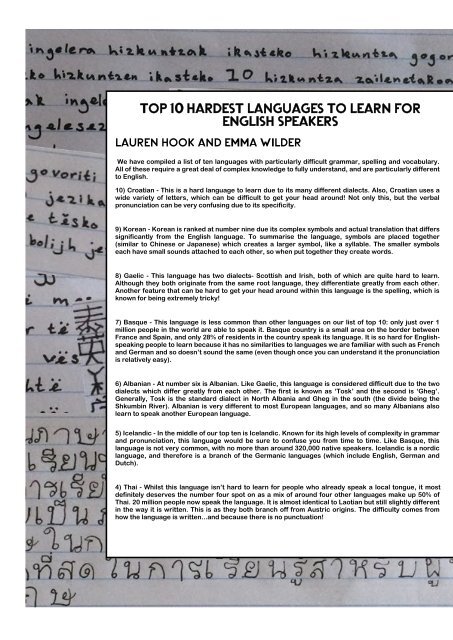The Inkling Volume 1
Create successful ePaper yourself
Turn your PDF publications into a flip-book with our unique Google optimized e-Paper software.
Top 10 Hardest Languages to Learn for<br />
English Speakers<br />
Lauren Hook and Emma Wilder<br />
We have compiled a list of ten languages with particularly difficult grammar, spelling and vocabulary.<br />
All of these require a great deal of complex knowledge to fully understand, and are particularly different<br />
to English.<br />
10) Croatian - This is a hard language to learn due to its many different dialects. Also, Croatian uses a<br />
wide variety of letters, which can be difficult to get your head around! Not only this, but the verbal<br />
pronunciation can be very confusing due to its specificity.<br />
9) Korean - Korean is ranked at number nine due its complex symbols and actual translation that differs<br />
significantly from the English language. To summarise the language, symbols are placed together<br />
(similar to Chinese or Japanese) which creates a larger symbol, like a syllable. <strong>The</strong> smaller symbols<br />
each have small sounds attached to each other, so when put together they create words.<br />
8) Gaelic - This language has two dialects- Scottish and Irish, both of which are quite hard to learn.<br />
Although they both originate from the same root language, they differentiate greatly from each other.<br />
Another feature that can be hard to get your head around within this language is the spelling, which is<br />
known for being extremely tricky!<br />
7) Basque - This language is less common than other languages on our list of top 10: only just over 1<br />
million people in the world are able to speak it. Basque country is a small area on the border between<br />
France and Spain, and only 28% of residents in the country speak its language. It is so hard for Englishspeaking<br />
people to learn because it has no similarities to languages we are familiar with such as French<br />
and German and so doesn’t sound the same (even though once you can understand it the pronunciation<br />
is relatively easy).<br />
6) Albanian - At number six is Albanian. Like Gaelic, this language is considered difficult due to the two<br />
dialects which differ greatly from each other. <strong>The</strong> first is known as ‘Tosk’ and the second is ‘Gheg’.<br />
Generally, Tosk is the standard dialect in North Albania and Gheg in the south (the divide being the<br />
Shkumbin River). Albanian is very different to most European languages, and so many Albanians also<br />
learn to speak another European language.<br />
5) Icelandic - In the middle of our top ten is Icelandic. Known for its high levels of complexity in grammar<br />
and pronunciation, this language would be sure to confuse you from time to time. Like Basque, this<br />
language is not very common, with no more than around 320,000 native speakers. Icelandic is a nordic<br />
language, and therefore is a branch of the Germanic languages (which include English, German and<br />
Dutch).<br />
4) Thai - Whilst this language isn’t hard to learn for people who already speak a local tongue, it most<br />
definitely deserves the number four spot on as a mix of around four other languages make up 50% of<br />
Thai. 20 million people now speak the language. It is almost identical to Laotian but still slightly different<br />
in the way it is written. This is as they both branch off from Austric origins. <strong>The</strong> difficulty comes from<br />
how the language is written...and because there is no punctuation!




